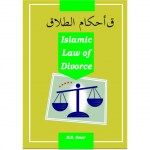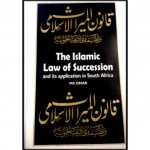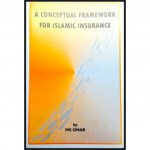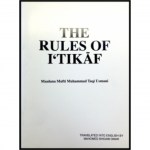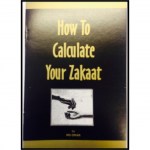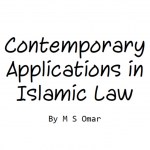Zakah Treatment of Shares in
A. Investments in Listed Companies (including UNLISTED PROPERTY SYNDICATION COMPANIES) and
B. Ownership of Unlisted Companies
Introduction
1. Zakaatable assets are gold, silver, cash, sound (collectible) book debts, and stock, which are deemed by the Shariah ( as growth assets) to be subject to Zakah under all circumstances, whether productively employed in commerce or not. اذا ظهر النماء او لم يظهر لان السبب قد يتحقق راجع: البناية فى شرح الهداية
2. Any other asset, including, without limitation, buildings, plant, machinery, and equipment, is exempt from Zakah, unless such asset was acquired, at the time of purchase, for the primary intention of resale, and as such constitutes trading stock, in the hands of the owner, as at the Zakah valuation date, at the end of the relevant Zakah year. الاصل ان ما سوى الاثمان من الاموال لا تجب فيه الزكاة الا بإعداده للتجارة و نواه للتجارة.
3. If the underlying assets of a specific company are exempt from Zakah, then Zakah is payable on the dividend income, or the unexpended remainder thereof, ( cash balance) , which is added to the aggregate value of the Zakaatable assets on the Zakah valuation date, at the end of the relevant Zakah year: gold + silver +cash +book debts +stock- less allowable liabilities: 2.577% ( to cover lunar year). و اذا لم يكن لدى الشركة موجودات الزكوية فانه يزكى ما يبقى من صافى الايراد فى نهاية الحول : الشركة
A. Investments in Listed Companies (including UNLISTED PROPERTY SYNDICATION COMPANIES)
4. Ownership of a share in the issued share capital of a listed company, whose core activity is halaal, represents, in substance, from a Shariah perspective, a pro rata undivided share in the underlying assets of that company, which may comprise of Zakaatable or non - Zakaatable assets, or, a combination of both. يمثل السهم حصة شائعة في موجوداتها الزكوية..... و محل العقد عند تداول الاسهم هو هذه الحصة الشائعة .
5. The shareholder should, by reference to the last available financial statements, identify and reasonably estimate the value of the underlying Zakaatable assets, (gold + silver + cash + book debts + stock) and deduct therefrom those specific liabilities incurred in respect of financing only Zakaatable assets, on the Zakah valuation date, at the end of the relevant Zakah year.
6. If the shareholder is unable to do so, for whatever reason, the shareholder should then pay Zakah on the market value of the share, as at the Zakah valuation date, at the end of the year. الاستثمارات في الأسهم فغرض الاحتفاظ بها ( النماء : اذا امكن عن طريق الشركة معرفة ما يخص السهم من الموجودات الزكوية: النقود و عروض التجارة و الديون المرجوة السداد فانه يزكى ذالك.
7. Shares in a listed company therefore acquired with the primary intention to resell at a profit (and not to hold as an investment for capital gain or growth) constitutes stock in trade, with the result that Zakah is payable thereon on the Zakah valuation date, at the market value thereof.
من اشترى اسهمه بنية التجارة فانه تجب عليه زكاة عروض التجارة، حسب قيمتها السوقية،
وأما المساهم المستثمر ، الذى لا يقصد بشرائها المتاجرة و المضاربة فيها، و إنما قصد الاستثمار طويل الأجل ، فانه يؤدي الزكاة عن موجودات الشركة الزكوية
فقط.
8. Shares in a listed company acquired with the primary intention to hold as an investment for capital gain or growth and dividend income, is subject to Zakah, by reference to their last available financial statements, by identifying and reasonably estimating the value of the underlying Zakaatable assets (gold + silver + cash + book debts + stock), and deducting therefrom those specific liabilities incurred in respect of financing only Zakaatable assets, on the Zakah valuation date, at the end of the relevant Zakah year.
9. If the shareholder sells the shareholder’s shares, during the course of the year, then the proceeds thereof, or, the unexpended remainder, ( cash balance), at the end of the Zakah year, is added to the aggregate value of the shareholder’s other remaining Zakaatable assets, and will be subject to Zakah. اذا باع المساهم اسهمه في اثناء الحول ضم ثمنها الى ماله الزكوية و زكاه معه عندما يجيء حول زكاته
It goes without saying that in a property syndication or property unit trust or REIT, the underlying buildings are exempt from Zakah unless the shares or units therein were acquired for trading purposes ( with the intention to resell) and therefore constitute stock.
B. Ownership of Unlisted Companies
10. Ownership of a share in the issued share capital of an unlisted company, whose core activity is halaal, represents, in substance, from a Shariah perspective, a pro-rata undivided share in the underlying assets of that company, which may comprise of Zakaatable or non - Zakaatable assets, or, a combination of both. يمثل السهم حصة شائعة في موجوداتها الزكوية..... و محل العقد عند تداول الاسهم هو هذه الحصة الشائعة .
11. The shareholder should, by reference to the last available financial statements, identify and reasonably estimate the value of the underlying Zakaatable assets (gold + silver + cash + book debts + stock) and deduct therefrom those specific liabilities incurred in respect of financing only Zakaatable assets, on the Zakah valuation date, at the end of the relevant Zakah year.
12. Zakah may be paid by the shareholder, in that capacity, pro rata to shareholding, (Hanafi school), or, by the company as a separate legal entity (in substance, upon the partnership principle), if the shareholders resolve to do so. The other schools (mazaaib) treat the assets of a partnership, held in co-ownership, by the partners, as the (notional) property of a single owner, (analogous to a legal person) for Zakah purposes. و تفسير ذالك ان مالكا و الشافعى و اكثر فقهاء الامصار اتفقوا على أن الخلطاء يزكون زكاة المالك الواحد. راجع بداية المجتهد.
13. In relation to a subsidiary company, the subsidiary (as a separate legal entity) may calculate and pay its own Zakah. If so, then, no Zakah is payable by the holding company on its investment value in the subsidiary company. If not, then the holding company must determine its pro rata share of Zakaatable assets in the subsidiary, on the same basis as stated in paragraph 11 above, and pay Zakah thereon.
14. If the shareholder sells his or her shares, during the course of the year, then the proceeds thereof, or, the unexpended remainder, ( cash balance) at the end of the Zakah year, is added to the aggregate value of the shareholder’s other remaining Zakaatable assets, and will be subject to Zakah. اذا باع المساهم اسهمه في اثناء الحول ضم ثمنها الى ماله الزكوية و زكاه معه عندما يجيء حول زكاته.
15. The aforegoing approach is consistent with the relevant resolutions of the distinguished International Islamic Fiqh Academy: resolutions number 28/3/4 and 121/3/13, and those of the eminent Al Baraka, 31st Islamic Economics Symposium (31/1).
واللة اعلم بالصواب.
And Allah Knows Best
MS Omar
Durban
Updated: 01 January 2024
1. The different situations are summarized below.
2. Where the person is employed in the public or private sector, and membership of a pension or provident fund forms part of the contract of employment, with the monthly contributions being deducted from his or her salary at source: Zakah is only payable, in the year of receipt or maturity, when the employee receives possession or control of the proceeds of the lump sum benefit. In such event, the net amount so received, after payment of prescribed taxes, will be added to the aggregate value of the Zakaatable assets( gold and silver + cash + trading stock + sound debts)and Zakah must be payable on the remaining unexpended amount thereof, on the relevant forthcoming Zakah valuation date, at the end of the year of receipt or maturity. No Zakah is payable for preceding years. و انما تجب الزكاة فيما يبقى عند نهاية الحول بضمه الى الموجودات الزكوية الاخرى و تزكيته
3. In this situation of employment, the contribution to the pension or provident fund, so deducted from salary at source, is from a Shariah perspective not deemed to be owned by the employee, but is in fact owned by the fund as a separate legal person. At best, the employee has, absenting possession, control and receipt, only a valid claim for the contribution against his or her employer. لا يقال انه ملكه الموءجر قبل قبضها فله المطالبة بها : ) البحرالراءق
4. In the case of a self - employed person, running his or her own business, different considerations apply. In this case, if the person voluntarily subscribes to a retirement annuity fund, Zakah is payable each year on the Fund value which must be added to the aggregate value of the Zakaatable assets as at the relevant Zakah valuation date. يوم وجوب الزكاة The reason is that this voluntary arrangement is analogous to a low risk fixed deposit, or, debenture for a predetermined period. The fact that the funds are not accessible until the member reaches the age of 55, or otherwise as prescribed by the rules of the Fund, has no Shari consequence for Zakah purposes, in this context. هذا بمنزلة السندات او ودائع لاجل
5. If the net lump sum proceeds of a pension or provident fund, due to a member upon retirement or resignation or retrenchment, are received or controlled by the beneficiary, and are thereafter voluntarily invested, ( eg: in a preservation fund), so as to inter alia provide a living annuity, then, in such event, the member must pay Zakah each year on the capital value of the investment. In addition, any unexpended cash balance remaining on his or her periodic income drawdown, will be added to his or her aggregate Zakaatable assets on his Zakah valuation date, at the end of the relevant Zakah year. و يزكى ما يبقى بضمه إلى الموجودات الزكوية الاخرى
يوم وجوب الزكاة عند نهاية الحول
Example:
Zaid enters into a contract of employment with a company. A term of the employment contract is that the employee must become a member of the provident or pension fund, ( “ Fund”), designated by his employer, and that his monthly contributions to the Fund will be deducted at source from his salary. Upon retirement or termination of employment, Zaid receives or is entitled to access a lump sum benefit of R 3 million ( after tax) from the Fund. The lump sum benefit of R 3 million is subject to Zakah in the year of receipt or maturity, although a portion may be used to purchase a life annuity. No Zakah is payable for preceding years.
If Zaid chooses to transfer the lump sum of R3 million ( or a portion thereof) to a preservation or pension generating fund, then Zaid must pay Zakah on the passing of each lunar year thereafter, on the value of his investment in the preservation or pension generating Fund, on his relevant Zakah valuation date.
On the other hand, Muhammad, a medical practitioner in private practice, chooses to subscribe, and make voluntary monthly contributions, to a retirement annuity fund. In this case, Muhammad must pay Zakah on the passing of each lunar year on the value of his investment in the retirement annuity fund, together with his other Zakaatable assets, on his Zakah valuation date.
And Allah Knows Best
M S Omar
8 May 2021
Updated: 23 March 2024
 SUPPORT
SUPPORT
